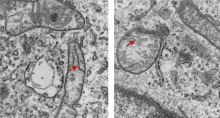Weill Cornell Medicine researchers are using machine learning, a form of artificial intelligence, to shed light on genetic mutations associated with spina bifida. In this birth defect, the neural tube that forms the spinal cord during pregnancy, does not close so that spinal nerves are exposed, resulting in paralysis and high risk of other complications.

EIPM Researcher Awarded Grant to Study Type 1 Diabetes
January 5, 2022
Researchers Awarded Grant to Study New Method of Islet Transplantation
Weill Cornell Medicine researchers have received a two-year $500,000 grant from JDRF to evaluate an innovative approach to islet cell transplantation, an experimental treatment for difficult-to-control type 1 diabetes. The research will be conducted in mouse models of this disease.

6 Biotech Breakthroughs of 2021 That Missed the Attention They Deserved
January 3, 2022
News about COVID-19 continues to relentlessly dominate as Omicron surges around the globe. Yet somehow, during the pandemic’s exhausting twists and turns, progress in other areas of health and biotech has marched on.

January 2022 EIPM Director’s Memo
January 3, 2022
January 2022
Dear Members of the Englander Institute,
Despite the challenges posed by the ongoing global pandemic, we made significant advancements in research, speed new treatments to patients like Cheryl Bonder, generated impressive news media coverage, earned high-profile awards, lead scientific events and conferences, expanded engagement with our growing social media audiences, and published research in leading journals.


Reducing Copper in the Body Reduces Risk of Aggressive Breast Cancer
December 15, 2021
Depleting copper levels may reduce the production of energy that cancer cells need to travel and establish themselves in other parts of the body by a process referred to as metastasis, according to a new study by investigators from Weill Cornell Medicine and Memorial Sloan Kettering Cancer Center (MSK). The discovery of the underlying mechanisms of how copper depletion may help reduce metastasis in breast cancer will help inform the design of future clinical trials.

Researchers Identify Significant Differences in Tumors of Younger and Older Patients
December 7, 2021
Investigators at Weill Cornell Medicine have identified significant differences in the molecular characteristics of tumors from younger and older cancer patients across several cancer types.

Protein Variant Identified that Renders Chemotherapy Ineffective
December 6, 2021
A new protein variant underlies the ability of gastric cancers to resist an otherwise effective family of chemotherapy drugs, according to a study by a multidisciplinary team at Weill Cornell Medicine. The results suggest a treatment strategy that could improve the prognoses of many patients with cancer.

December 2021 EIPM Director's Memo
December 2, 2021
Dear Members of the Englander Institute,
It’s always a pleasure to share the important work and contributions of our colleagues, especially those who are just beginning their careers. Over the next month we will feature interviews with several of our team members on the News page of our website (see below). I hope you enjoy learning more about their backgrounds and research interests.

Detecting cancer with a simple blood draw could soon be a reality
November 24, 2021
One experimental test can detect 50 different cancers.
Every year, thousands of Americans undergo routine screening to catch cancer in its early stages, while it’s still treatable. But these routine tests can be painful and invasive, and doctors only regularly screen for five of some of the most common types of cancer.

Diabetes and Atherosclerosis Link
November 10, 2021
Hyperglycemia—excess blood sugar, the central feature of diabetes—can react with immune proteins to cause changes in the immune system, including those that promote atherosclerosis.
While doctors have known for decades that chronic hyperglycemia increases the risk of atherosclerosis and weakens immunity against infections, the new study describes the molecular pathways by which it happens.

